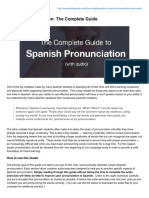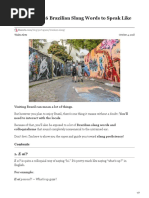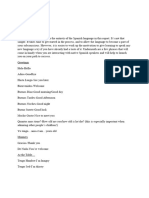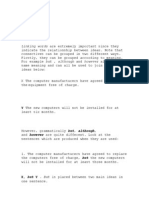Cbs 02 Guide
Uploaded by
bankkingCbs 02 Guide
Uploaded by
bankkingOctober 25, 2006
Lesson 02 Notes
In this edition: greetings at different times of the day; saying goodbye; giving your name
Adis y hasta luego! Lesson 02
Programme Notes
Welcome to Coffee Break Spanish, the new podcast aimed at learners of Spanish. In Coffee Break Spanish well be guiding you through the beginnings of the Spanish language and helping you learn the basics of Spanish. This second lesson builds on the content of Lesson 01 where we learned some greetings and how to ask people how they are feeling. In Lesson 02 we cover greetings for different times of the day, words for saying goodbye, and how to introduce yourself. Basta ya! Lets get straight into learning Spanish!
literally means good days. The same construction is used for good afternoon:
buenas tardes good afternoon
You can say buenase tardes from after lunch until the middle of the evening. Like buenos das the phrase literally means good afternoons, ie. the word tardes is in the plural form. To say good night you say:
buenas noches good night
This phrase can be used when you leave somewhere at night, but it can also be used when you arrive somewhere in the evening. If youre confused about when to use buenas tardes and buenas noches, this rule may help: if its daylight, use buenas tardes, if its dark, use buenas noches. It normally works! You may have noticed that the word for good in the above phrases changes depending on what follows it: its buenOs das and buenAs tardes / noches.
Greetings
Last week we learned hola, meaning hello. This works in an informal way for any time of the day. To say good morning, use this phrase:
buenos das good morning
Buenos das is used until lunchtime, normally around 2pm in Spain, although this may vary in other Spanish speaking countries. The phrase
Spanish, like many languages uses different genders, making some words masculine and some words feminine. In the case of da, the word is masculine so the adjective has to be in the masculine form. The word tarde is feminine, so the adjective has to be in the feminine form. Well be talking more about this in future lessons so dont let it worry you just now!
me llamo... my name is... / Im called...
The word llamo uses a double l and this sounds quite different depending on which Spanishspeaking country youre familiar with. In Spain it generally sounds like ly, so me llamo sounds like me lyamo. Listen to the recording for examples of pronunciation. There are two versions of the nal phrase in this lesson, one for males and one for females. If youre male, to say its nice to meet you you used the phrase:
Saying goodbye
The straightforward word for goodbye is:
adis goodbye
Just like in English where the word for goodbye comes from God be with you, adis is linked to the word for God, dos. Pronunciation tip: try to make sure your d in adis is a soft d, almost like the th in the English word this. You can also use other phrases describing when youre likely to see the person again. You can say:
encantado nice to meet you (m)
If youre female you change the -o ending to -a:
encantada nice to meet you (f)
In some books when one word with two forms ending in either -o or -a is given it is sometimes written as encantad@. The theory is that the @ symbol encapsulates both the o and a endings. This is an informal way of writing and is particularly common on the internet. Lets put some of the words and phrases weve covered in this lesson into a conversation. Mark: Hola, buenos das. Kara: Hola, buenos das. Mark: Qu tal? Kara: Muy bien, gracias. Qu tal? Mark: Muy bien. Me llamo Mark. Kara: Encantada. Me llamo Kara. Mark: Encantado.
hasta luego see you later
Just like in English, hasta luego is used when youre not sure when youll see the person again and is a very common way to bid farewell to someone. Hasta itself means until.
hasta pronto see you soon
Hasta pronto is used when youre fairly certain youll see the person soon. If you are likely to see the person the following day you can use:
hasta maana see you tomorrow
Notice the letter in this phrase: this is used to represent a nasal n and is pronounced rather like the ni in onion. It is very common in Spanish and in dictionaries it is treated as a different letter to n. It is used in the word for Spanish itself: espaol, which sounds like espanyol. The ~ mark is called a tilde. See the bonus vocabulary below for some other phrases using hasta.
Bonus vocabulary
In each edition of Coffee Break Spanish we cover the basic language you need to communicate. However we also provide some additional vocabulary for our listeners who download the extra materials. You can download the bonus vocabulary recording from our website. For the full list of vocabulary for this lesson, including the bonus words and phrases, see overleaf.
Giving your name
To say my name is... or I am called... you use the phrase:
CoffeeBreakSpanish: Lesson 02 - Key Vocabulary
buenos das buenas tardes buenas noches adis hasta luego hasta pronto hasta maana me llamo... encantado / encantada good morning good afternoon (also early evening) good evening (arriving), good night (departing) goodbye see you later see you soon see you tomorrow my name is... / Im called... pleased to meet you
CoffeeBreakSpanish: Lesson 02 - Bonus Vocabulary
chao nos vemos hasta la prxima hasta otra hasta la semana que viene mucho gusto* bye (informal) - from Italian ciao See you. (lit. well see each other) until the next time until another time until next week pleased to meet you
*Unlike encantado / encantada, the phrase mucho gusto does not change depending on whether you are male or female. Mucho gusto literally means much pleasure and therefore the construction is not based on an adjective which has to agree with the person who is being described. Again, dont worry about this! We know that some of you like to know why things are the way they are. If youre quite happy not knowing, then just ignore these grammar tips for the time being!
CoffeeBreakSpanish.com
All materials Copyright Radio Lingua International
You might also like
- Viaje a Madrid Bilingual Spanish Novel for Beginners With English83% (6)Viaje a Madrid Bilingual Spanish Novel for Beginners With English310 pages
- Spanish for Gay Men (Spanish That Was Never Taught in the Classroom!)From EverandSpanish for Gay Men (Spanish That Was Never Taught in the Classroom!)No ratings yet
- 10 Differences Between Spanish and EnglishNo ratings yet10 Differences Between Spanish and English6 pages
- Learn Spanish Language (Easier) With Cognates50% (2)Learn Spanish Language (Easier) With Cognates174 pages
- Basic Spanish - Lesson 1 - Introductions & Greetings100% (1)Basic Spanish - Lesson 1 - Introductions & Greetings38 pages
- Learn Spanish: A beginner's guide to learning basic Spanish fast, including useful common words and phrases!From EverandLearn Spanish: A beginner's guide to learning basic Spanish fast, including useful common words and phrases!No ratings yet
- Must-Know Spanish Travel Phrases For a Fun Trip: Learn How to Be Polite, Book a Table at the Restaurant, Ask for Directions, and much more in any Spanish-Speaking Country (English to Spanish)From EverandMust-Know Spanish Travel Phrases For a Fun Trip: Learn How to Be Polite, Book a Table at the Restaurant, Ask for Directions, and much more in any Spanish-Speaking Country (English to Spanish)No ratings yet
- Spanish Pronunciation: The Complete Guide: How To Use This Guide100% (1)Spanish Pronunciation: The Complete Guide: How To Use This Guide23 pages
- Local Lingo - 16 Brazilian Slang Words To Speak Like A Native!No ratings yetLocal Lingo - 16 Brazilian Slang Words To Speak Like A Native!7 pages
- Need Help With Beginner Spanish Grammar? Relax, Here Are 5 Lessons To StartNo ratings yetNeed Help With Beginner Spanish Grammar? Relax, Here Are 5 Lessons To Start10 pages
- Absolute Beginner S3 #21 How Do You Say This in Spanish?: Lesson NotesNo ratings yetAbsolute Beginner S3 #21 How Do You Say This in Spanish?: Lesson Notes7 pages
- 7 Spanish Mistakes You Don’t Want to MakeNo ratings yet7 Spanish Mistakes You Don’t Want to Make7 pages
- KEY-AND-SEMI-KEY-LETTER-GUIDE-FOR-PRONOUNCING-ENGLISH.-version-2No ratings yetKEY-AND-SEMI-KEY-LETTER-GUIDE-FOR-PRONOUNCING-ENGLISH.-version-221 pages
- This Is Getting Tense! Your All-In-One Guide To Spanish TensesNo ratings yetThis Is Getting Tense! Your All-In-One Guide To Spanish Tenses11 pages
- Learn Spanish 21 Day Challenge: For Beginners And Intermediate Includes Stories, and Conversations: Learn Spanish, #3From EverandLearn Spanish 21 Day Challenge: For Beginners And Intermediate Includes Stories, and Conversations: Learn Spanish, #3No ratings yet
- Captura de Pantalla 2023-07-13 A La(s) 20.43.55No ratings yetCaptura de Pantalla 2023-07-13 A La(s) 20.43.551 page
- What They Didn't Teach You in Spanish Class: Slang Phrases for the Café, Club, Bar, Bedroom, Ball Game and MoreFrom EverandWhat They Didn't Teach You in Spanish Class: Slang Phrases for the Café, Club, Bar, Bedroom, Ball Game and More4/5 (1)
- The Big Book of Spanish Phrases - Orbis Language Center75% (4)The Big Book of Spanish Phrases - Orbis Language Center206 pages
- Easy Spanish Phrase Book New Edition: Over 700 Realistic Phrases for Everyday UseFrom EverandEasy Spanish Phrase Book New Edition: Over 700 Realistic Phrases for Everyday UseNo ratings yet
- The Spanish Verbs & Phrases Workbook For Adult Beginners: Spanish Language LearningFrom EverandThe Spanish Verbs & Phrases Workbook For Adult Beginners: Spanish Language LearningNo ratings yet
- Easy Spanish Phrase Book NEW EDITION: Over 700 Phrases for Everyday UseFrom EverandEasy Spanish Phrase Book NEW EDITION: Over 700 Phrases for Everyday Use3/5 (5)
- Maxcom Telecomunicaciones Sa: 1Q11 Results: Lower Mtrs Offset Weaker TrendsNo ratings yetMaxcom Telecomunicaciones Sa: 1Q11 Results: Lower Mtrs Offset Weaker Trends7 pages
- Warren Buffett 2009 Letter To ShareholdersNo ratings yetWarren Buffett 2009 Letter To Shareholders19 pages
- 2.2 Vocab - en Mi Colegio Updated For 20-2021No ratings yet2.2 Vocab - en Mi Colegio Updated For 20-20212 pages
- HandlingComplete VerbsofTeluguinMachineTranslationNo ratings yetHandlingComplete VerbsofTeluguinMachineTranslation7 pages
- Oisín I Dtír Na Nóg (Finished More or Less)No ratings yetOisín I Dtír Na Nóg (Finished More or Less)13 pages
- Tenses: Verbs in The Past, Present and Future TenseNo ratings yetTenses: Verbs in The Past, Present and Future Tense28 pages
- Material para Clase de Ingles 3 para Subir A PlataformaNo ratings yetMaterial para Clase de Ingles 3 para Subir A Plataforma17 pages
- English2 Melc Based 1st Periodic Exam With Answer Key and TosNo ratings yetEnglish2 Melc Based 1st Periodic Exam With Answer Key and Tos9 pages
- Morphological Composition 2. Morphological Characteristics 3. Patterns of Combinability 4. Syntactic Functions 5. Substantivized NumeralsNo ratings yetMorphological Composition 2. Morphological Characteristics 3. Patterns of Combinability 4. Syntactic Functions 5. Substantivized Numerals6 pages
- Cefr Lesson Plan 2018 (2!10!2018) Speaking Year 3No ratings yetCefr Lesson Plan 2018 (2!10!2018) Speaking Year 31 page
- An Analysis of Semantic Ambiguity Found in Song Lyrics Before 2000No ratings yetAn Analysis of Semantic Ambiguity Found in Song Lyrics Before 20002 pages
- To Understand How To Use Who Whose and WhomNo ratings yetTo Understand How To Use Who Whose and Whom6 pages
- Noun Phrase and Gerund Phrase - A, An, The Usage PDFNo ratings yetNoun Phrase and Gerund Phrase - A, An, The Usage PDF56 pages
- (Ebook) Arabic: An essential Grammar by Faruk Abu-Chacra ISBN 9781315620091, 131562009X - Download the full ebook version right now100% (1)(Ebook) Arabic: An essential Grammar by Faruk Abu-Chacra ISBN 9781315620091, 131562009X - Download the full ebook version right now49 pages
- Liceul Teoretic Creștin Pro Deo, Cluj-NapocaNo ratings yetLiceul Teoretic Creștin Pro Deo, Cluj-Napoca4 pages































































































